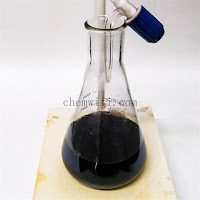0.1 N Potassium Dichromate Solution
Preparation of 0.1 N Potassium dichromate (K2Cr2O7) Solution
- Transfer 6 g of potassium dichromate (K2Cr2O7) to a platinum dish and dry at 120°C for 4 h. Cool in a desiccator.
- Place 4.9 g of the dried K2Cr2O7 in a 1-L volumetric flask, and
- Add 100 mL of water. Swirl to dissolve and when solution is complete, dilute to the mark with water and mix.
- Store the solution in a glass-stoppered bottle.
NOTE —If desired, the solution also may be prepared on a determinate basis by accurately weighing dried primary standard potassium dichromate,9 and diluting the solution carefully to volume.
Standardization of 0.1 N Potassium dichromate (K2Cr2O7) Solution
Place 40 ml of water in a 250-mL glass-stoppered conical flask. and- Add 40 mL, accurately measured, of the K2Cr2O7 solution. Stopper the flask, swirl to mix, remove the stopper, and
- Add 3 g of potassium iodide (KI), 2 g of sodium bicarbonate (NaHCO3), and 5 mL of hydrochloric acid (HCl).
- Stopper the flask quickly, swirl to ensure mixing, and let stand in the dark for 10 min.
- Rinse the stopper and inner walls of the flask with water and titrate with freshly Standardized 0.1 N Sodium thiosulfate solution (Na2S2O3) until the solution is yellowish green.
- Add 2 mL of starch solution (10 g/L), and continue the titration to the disappearance of the blue color.
Initial point Color End point color
Calculation
Calculate the normality of the K2Cr2O7 solution, as follows:
A = B * C / D
where:
A = normality of the K2Cr2O7 solution,
B = milliliters of Na2S2O3 solution required for titration of the solution,
C = normality of the Na2S2O3 solution, and
D = milliliters of K2Cr2O7 solution used.
Stability
Re-standardize monthly.
Read more ….


